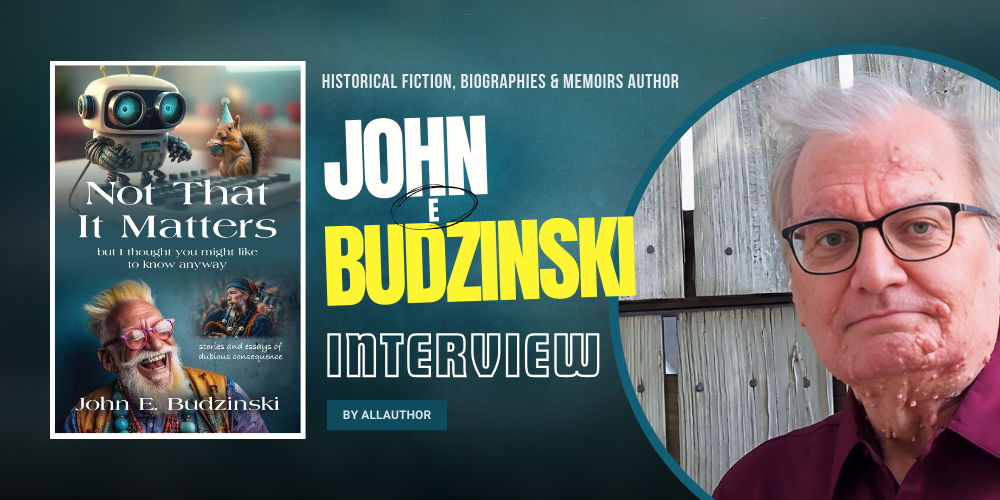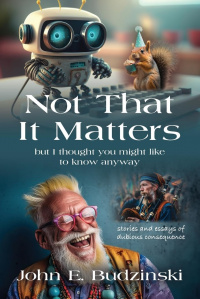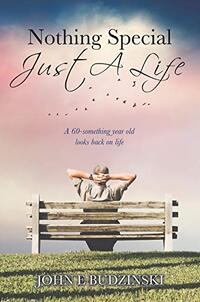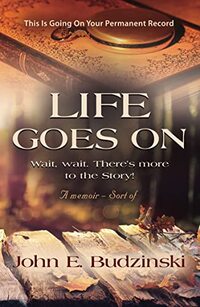Genre:
Historical Fiction Biographies & Memoirs- Country: United States
- Books: 3
- Profession: Author
- Member Since: Jan 2021
- Profile Views: 6,722
- Followers: 95
- VISIT AUTHOR: Website, Facebook, Twitter, Goodreads, Amazon, Linkedin,
Growing up in the Lordship section of Stratford, Connecticut, John E. Budzinski always had a penchant for reading and telling stories. The town library was a short four-mile walk or bike ride away. On Saturdays, he often disappeared without a trace to explore and read. It didn't take very long to rummage through everything of interest in the small library. Once he did, he took the bus to adjacent towns’ libraries – learning to be the explorer he would become.
John told stories about his cat Louie, baseball, events he experienced, the people he met, and the stories they told. Strangely though, he never talked about his family very often. He took particular joy in yammering about the weirdness of the world he saw around him and the characters he met along the way. And there were always stories of the dreams he wanted to come true and the wonders he wanted to experience. They were simple – totally uncomplicated stories about life’s strangeness and unpredictability.
His writing of those stories began from an ill-fainted attempt to impress a college girlfriend’s father. He was the News Editor of a local paper in Virginia. John never felt too comfortable with him, feeling like all guys do – the girlfriend’s father sees him as a jerk.
John wrote some op-ed pieces hoping to show the News Editor father that he may be a jerk, but at least he was an intelligent jerk. His well-thought-out ploy didn’t work, and said father still thought of John as a 25-watt bulb in a 100-watt world.
His misguided attempt to win the favor of his girlfriend’s father didn’t dissuade John. Instead, it begat his love of words and language. He formed a special appreciation for stories, both his and those of friends and strangers. Good stories are good stories, especially when they remind others of their stories.
Many of those stories found their way into a column he penned for a New Hampshire weekly. His writing has appeared in the Boston Globe, Quincy, (MA) Patriot Ledger, Worcester, (MA) Telegram & Gazette, Wyoming Tribune Eagle, Connecticut Post, and Waterbury (CT) Republican American, among others.
A graduate of Virginia Commonwealth University in Richmond, he has studied at Northeastern University in Boston, University of Bridgeport (CT), Fairfield University (CT), and Temple University in Philadelphia. A seasoned traveler and accomplished photographer, John E. Budzinski lives near the UNSECO Literary City of Iowa City, IA, where there is nothing he enjoys more than going out to a local haunt for some ribs and cold beer, to hear and tell stories of life.
John E. Budzinski's Books
Stay in the loop on books by John E. Budzinski. See upcoming and best-selling books by the author here. You'll also find the deals on books by John E. Budzinski.
** Please note that the information or price displayed here may not be the updated. Make sure to double-check the latest book price before buying books.
** Also, there might be other books by John E. Budzinski not listed on AllAuthor.
| Book |
|---|
Nothing Special - Just A Life: A 60-Something Year Old Looks Back on Lifeby John E. BudzinskiPublish: Sep 18, 2019Biographies & Memoirs |
Life Goes On: Wait, wait. There's More to the Story!by John E. BudzinskiPublish: Oct 10, 2021Biographies & Memoirs |
John E. Budzinski Interview On 29, Mar 2024
 "John E. Budzinski, a native of the Lordship neighborhood in Stratford, Connecticut, developed a love for storytelling and exploration at a young age. From anecdotes about his cat Louie to reflections on the quirks of the world around him, Budzinski's narratives are infused with humor, insight, and a touch of whimsy. Budzinski's life is a testament to the power of storytelling and the joy found in sharing the richness of human experience."
"John E. Budzinski, a native of the Lordship neighborhood in Stratford, Connecticut, developed a love for storytelling and exploration at a young age. From anecdotes about his cat Louie to reflections on the quirks of the world around him, Budzinski's narratives are infused with humor, insight, and a touch of whimsy. Budzinski's life is a testament to the power of storytelling and the joy found in sharing the richness of human experience."
Stratford, Connecticut, is a historic New England town dating back to the early 1600s. It is best known for being the home of the American Shakespeare Theatre and Sikorsky Helicopters. It also had two of the best fast-pitch softball teams in the world, the women’s Raybestos Brakettes and the men’s Raybestos Cardinals. Lordship was the neighborhood with a couple thousand people and a fairly close community. As a kid, it was tough to get into trouble. No matter where we went, someone knew us and our parents. They consistently reported back to our parents every misdeed we committed and the nefarious characters they saw us with. We had an airport (with some commercial flights), a cemetery, a half dozen hotdog and hamburger stands, two pizza restaurants, a barber shop, a lighthouse dating back to 1822, three beaches, a roller skating rink, kiddie amusement park, two churches and two grammar schools that had a rivalry as intense as the New York Yankees/Boston Red Sox, Michigan/Ohio State, or USA/USSR. The schools hosted summer day camps where something was always going on. You had to work at it to be bored or say, “There is nothing to do.” We were lucky to have all that. The best thing, though, was the Lordship Fathers Club, whose primary purpose was to improve things for their kids and the community. They sponsored the children’s Christmas Party, Easter Egg hunt, Halloween, costume parade and contest, and the yearly variety show. Kids knew their fathers (and all parents) cared about them. These things and events sparked stories in others and me. Storytelling was part of the fun, but you had to have stories to participate. And to ensure your stories are fun and accurate, you must research and read.
What motivated you to explore libraries beyond your own town, even taking buses to adjacent towns’ libraries? Were there any specific books or authors that left a lasting impact on you during this time?All kids love stories, and I was no exception. We didn’t have many books at home, so I looked forward to when it was my class’s turn to use the library. The library was small, but still had more books than I could possibly read. Our local libraries in Stratford and Bridgeport impressed me because they were much larger than our school library. “I know there are bigger libraries, but they are fine right now.” “If you think they’re big, you should see the New York City Library,” a classmate said. We thought she was exaggerating a might with her description. But one Saturday morning, a group of my 6th-grade classmates told our parents we were going to the mall, then met covertly at the train station and headed to New York City. We walked a couple of blocks from the train station and stopped in front of a massive white building with two lions named Patience and Fortitude standing guard. I never conceived of a library being so humongous and never dreamed there could be so many books. It blew me away, and not just with all the books. It was also the paintings, sculptures, and music rooms. I was hooked, and I wanted to explore every library. I’ve visited many city, state, and university libraries since then, including the most incredible library in the world (as far as I am concerned), the Library of Congress in Washington, D.C., where I had a research card.
Favorite books and authors: Like all guys, I loved books like Treasure Island, Around the World in 80 Days, and 20,000 Leagues Under the Sea. I am sometimes embarrassed to say Mark Twain is my favorite author—it seems we are supposed to say he is when asked about favorite authors. But I think my reasons differ from most. He was so prolific and wide-ranging. In Tom Sawyer, he wrote about being a kid. It was fun. He did the same with Huckleberry Finn, except in that book, he forced readers to think a bit about subjects that were not very pleasant. Then he wrote his travel logs, like Following the Equator and The Stranger Abroad. Reading those books made me a better traveler. I do not know where the thought of writing The Diary of Adam and Eve came from, but it made Twain so much more fascinating. The man wrote about everything and did it smartly. People know him for his humor, but he also wrote with insight and intelligence. Everything in life seemed to fascinate him, and he found time to write about it. I love ALL his work.
Your stories often revolve around everyday life and the quirks of human nature. What draws you to these subjects, and how do you find inspiration in the mundane?I like the phrase “quirks of human nature.” I have been fortunate to have traveled, and in my travels, one simple observation fascinated me the most. That is, how very similar we humans are in so many ways. It doesn’t matter what town, village, or hamlet we call home; we share so much. The food may have different spices, and the music may have different beats or come from strange instruments. But we still have celebrations where we share the food, sing, and dance to the music. We have families, pets, schools, and all kinds of celebrations. We have heroes, villains, and our BFFs. Very few of us will have our bust in a hall of fame because we lived simple lives. But that is the whole point! Your life may be simple, but only YOU lived it. That does make it special and interesting. All people love stories, and I want my simple stories to remind readers of their simple stories and to inspire them, not just to remember them but to write them down and tell them—to celebrate them. The greatest fun and pleasure I get as an author is when readers tell me one of my yarns reminded them of something that happened to them.
You mentioned your college girlfriend’s father as an initial inspiration for your writing. How did this encounter shape your journey as a writer, and what lessons did you learn from it?Curt was the news editor for the local paper, one of the staff members who decided what stories get into the paper daily. Ever since my days as a newspaper carrier, I have loved newspapers. Curt and I talked now and then about the news and how papers report it. We had our disagreements. I knew my arguments did not sway him, and he probably wondered (as all fathers do), just how bright is this guy his daughter is dating? So, I wrote some op-ed pieces about economics and public policy to let him know I could think a little. He didn’t mention them to me, but I asked Jennifer what he thought. “Well, he didn’t have much to say about what you wrote or how you said it,” she told me. “But he was quite impressed someone your age had the guts, and took the time to write about the subjects.” I want to entertain and inform readers with my words, knowing I have to put myself out there and take the criticism that comes with it. Remembering Curt’s words gives me the confidence and the courage to keep doing so—keep exploring and keep writing.
Could you elaborate on your transition from writing op-ed pieces to crafting stories for a wider audience? What were some of the challenges you faced during this transition?I would not label the transition as involving challenges to overcome. If anything, the change allowed for more creative freedom. All writing styles or genres have particular rules of engagement for how they work. Rules for op-ed writing dictate you stay brief, use forceful words and language, and draw a conclusion—take a stand. The goal is not to tell readers how to think, but rather what to think—and why! Language is critical—using just the proper words and phrasing. When I began to open up the writing to a broader audience, I learned I do not have to be as judicious in selecting words. My language can be freer, wider, and more colloquial. I could say more and expand on my thoughts. I have two goals when I write. First, I want to pull the reader into my world and entertain them when they arrive. Second, I need to create thoughts and ideas that allow readers to use my stories to float into their worlds—to see similarities. If there is any challenge, it is knowing when to close the story out and when to leave it open-ended.
Your column for a New Hampshire weekly and contributions to various newspapers showcase a diverse range of stories. How do you decide which stories to tell, and what do you hope readers take away from them?Sometimes my editor or friends suggest a topic I should explore. Occasionally, I am present when news or other events occur, creating a beginning point. But mostly, the stories come from just wandering about through life and observing. I take in everything, and the most fun are the mundane. We stand in lines at the bank or post office, we get stuck in traffic, our boss is being unreasonable today, and more. They are simple events, but everyone can relate to them. I am more of an introvert, but I will talk to anyone. I am not proud. And everyone has a story, and people love talking about themselves. I have become a good listener who remembers what others tell me. The key is seeing something bizarre or strange in what I hear, and then spinning it into a story with a profound or surprising ending. Sometimes finding a local spin is challenging, but I have traveled a lot, so doing that is not too difficult. Sometimes, there is a moral. Occasionally, it’s just an ironic moment in life. Almost always, I do not have to look too hard or too deep to find my subjects or topics. As I say in my books, “Life is Weird!” I just write what I see and experience. I hope my readers take away a smile and recognize that they are not alone—we all are in this together. Hang on tight to each other.
Photography seems to be another passion of yours. How does visual storytelling complement your written narratives, and do you find inspiration in the intersection of these mediums?Photography is great in that it freezes time—everything stops. Some photos stand independently, while others require a slug line to explain what is happening. With a photo, you can take your time to examine the entire picture and take it in. Storytelling (writing) is like that. You have to stop and take it all in before beginning or continuing. With photos, though, most people see just the center or primary subject. However, there can be so much happening around the edges. Good storytelling requires taking the time to look around the edges so you can tell the complete story. Writing has made me a better photographer—I look to see the complete picture (story) before I shoot. Photography has made me a better writer—I look around the edges before I write.
Living near Iowa City, a UNESCO Literary City, must provide ample opportunities for literary engagement. How has the local literary scene influenced your work, if at all? Your enjoyment of ribs and cold beer at local haunts sounds like a perfect setting for storytelling. How do these gatherings inspire your storytelling, and do you often draw from personal experiences in your tales?The Iowa Writers Project at the University of Iowa is the oldest MFA program in the USA, 87 years old. It feeds much of the culture in Iowa City. One local hotel has a small library with books by all the writers who have studied at the university. There are hundreds of books there. The Summer Writers Festival at the University of Iowa has dozens of weeklong and weekend workshops attended by writers from around the USA and the world. There are other literary festivals and events throughout the year. Downtown has a Literary Walk celebrating works by 49 writers with ties to Iowa. The Literary Walk comprises a series of bronze relief panels featuring the authors’ words and attributions. It is easy to be inspired by just walking around downtown.
While the effects from Covid-19 caused several pubs and restaurants to close, there still are haunts where writers gather. Books and writing are a common topic of conversation. I see great characters in the joints and covertly take notes about many of them. I know they will end up in stories someday. One fun (if not frustrating) thing about being in these haunts is the conversation about writing, what people are doing, and how they approach it. Several times when people asked me, I was a little embarrassed because my reply was not as smooth or clear as I would have liked. Those experiences forced me to go home and evaluate myself, so I am better prepared the next time. No matter what you do, it is nice to be among your tribe. In Iowa City, I am among my tribe of writers. I am challenged, and it is fun, educational, and inspiring.
Your writing has appeared in newspapers across different states. How do you adapt your storytelling to resonate with diverse audiences and regional cultures?Most of my stories are universal and can easily fit in any market. However, sometimes it is crucial to find a local spin. When appropriate, I will change names and times. Often, it is easy to add a local slant by mentioning local places, traditions, or history. I can do that because I have been so fortunate to have traveled. Travel helped develop my research and interviewing skills and gave me knowledge of places. It has also grown my contact list. I’ve spoken to reporters, local business people, teachers, and others, so filling in the blanks and adding a local slant for a story is not tricky.
Are there any recurring themes or motifs in your writing that hold personal significance to you? If so, what are they, and why do they resonate with you?Two themes pop up in my work consistently: the common elements of cultures and friendship. First, it still surprises me when I travel to see that, with all the differences we have among cultures, just how much alike we are. That universality ties stories together and allows them to play anywhere, and I enjoy exploring it. The second is friendship. I have written about friendship more than any other subject. I wonder how some friendships stay with us from kindergarten through death. Other times, a best friend drifts away from us for whatever reason. We can out-grow friends, or they out-grow us. Co-workers who were close to us fall out of touch when we change jobs. We seem to have lots of short-term friends. A question I have been trying to answer forever is this. Do we choose friends, or do they choose us? Whatever the answer, it is that choice that makes friendships special, and why I am fascinated by them.
How do you approach the craft of storytelling? Do you have any rituals or practices that help you get into the writing mindset?I do not have a magic formula mindset to get into writing mode. Writing is a job that requires inspiration to jumpstart the process. The inspiration comes from many places: something I read or see on T.V., or hear on the radio, talking with a friend, or eavesdropping in on a conversation. Very often, an idea has festered in my mind, and I cannot shake it off, so I write about it. Inspiration can come at any time. I’ve gotten out of bed at 2 or 3 in the morning and headed to my desk when some idea hit me—more than once! It’s nuts. The key is that once inspiration hits, you must start writing. One thing that I wouldn’t call a ritual, but it is just as important is, I want my stories to be authentic and truthful. It’s rare for me to change names, locations, or timing. So, I research insistently, even if the story is about my experiences. I fact-check by calling friends, verifying dates and timing, and ensuring everything ties together. It takes time and effort, and if I have one writer’s obsession, this is it.
What books are you writing or planning to write in the future?I am working on several items. The first is “Two Cats In The Yard.” It is the third and last in my memoir series. It is about a quest to find a place to call home. The publication date is set for later in 2024. Then, “It Started With Baseball” is about the lies and deceptions authority types told us since childhood and all the confusion it has caused. “Oliver and Nancy” is a story about a kitten who moves into the neighborhood and learns the ropes—how cats behave — by an older and wiser cat. The story uses characters loosely based on the musical “Oliver.” Finally, I have a historical fiction novel set in Appalachia, Virginia, from 1973 to 1977. The town is a one industry and one company town. The plant has identified the town and county for generations, dating back to the last century. Headquarters is closing the local plant, and the story follows the young corporate man sent to close the plant and the days of the people—their history and futures—against the backdrop of Watergate and changes in the Commonwealth of Virginia. They are important stories, but let’s maintain perspective. They are not as critical and important as the local plant closing and the local culture dying.
How long have you been associated with AllAuthor? How has your experience been?I came to AllAuthor in 2020. The experience has been positive for several reasons. First, AllAuthor is a place where authors can hang out with other authors. We can share thoughts, ideas, and encouragement. All of life is constantly changing. Publishing is no different. AllAuthor helps me keep up. Second, it is a place where readers can visit to interface with their favorite authors and discover new ones. Also, I appreciate AllAuthor’s Branding and Promotions and the various tools on the site. Authors have to be visible and market themselves. AllAuthor is part of my process and plan for doing that.
Ask John E. Budzinski a Question
Have brimming questions to ask author John E. Budzinski? Ask whatever you like, but keep it appropriate.
** Please note that unanswered questions will not appear on the page. Refrain from posting promotional messages.




